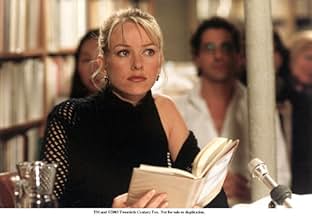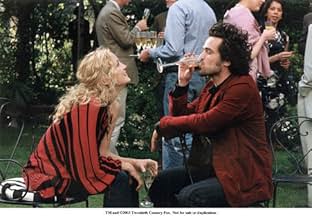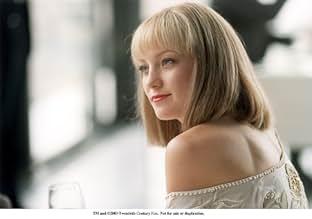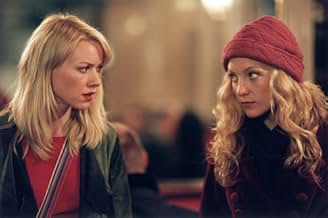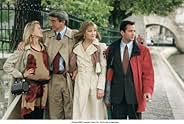IMDb-BEWERTUNG
4,9/10
12.400
IHRE BEWERTUNG
Französische vs. amerikanische soziale Bräuche und Verhaltensweisen werden in einer Geschichte über einen Amerikaner beobachtet, der ihre französische Schwester in Paris besucht.Französische vs. amerikanische soziale Bräuche und Verhaltensweisen werden in einer Geschichte über einen Amerikaner beobachtet, der ihre französische Schwester in Paris besucht.Französische vs. amerikanische soziale Bräuche und Verhaltensweisen werden in einer Geschichte über einen Amerikaner beobachtet, der ihre französische Schwester in Paris besucht.
- Regie
- Drehbuch
- Hauptbesetzung
- Auszeichnungen
- 2 wins total
Empfohlene Bewertungen
I think this could have been an interesting film. Instead, it shows the French as being close-minded, rude and arrogant with no concern about other people's feelings. The American sisters are annoying in their lack of backbone. Instead of standing up for themselves or each other, they simply lie down and let husbands, boyfriends and in-laws humiliate them. Their last name should be doormat. The scenery is both beautiful and breathtaking. The restaurant scenes gives us some insight on the French artfulness of food. Dining is not just a daily routine but an adventure of taste, color and texture. Even when insulting, the French language is a pleasure to hear. Sadly, the bad heavily outweighs the good in this movie.
It's amusing to read some of the comments in this page of IMDb. Most postings place the blame for what they perceive as the failure of this picture on James Ivory, Ismael Merchant and Ruth Prawer Jhabvala, the successful creative team of some of the best movies of recent years. In fact, the sin they appear to have committed was to adapt the Diane Johnson's novel about the contrasts she has always written about between two cultures that should be more similar: the French and American, yet, as we read in the book, and now watched in the film, they are not as close as one would imagine.
First, the French one sees portrayed in the film belong to the high classes that are imbued in their traditions, savoir faire, their sense of style and being B.C.B.G., something the Americans, being somehow a new society without those traditions cannot comprehend. Money is a taboo subject to be spoken at all by the wealthy French, whereas in America the flaunting of having made fortunes and having millions is an everyday subject for the higher ups.
Ms. Johnson, who has lived in France for quite some time, is an observant of that society. In her many books about life in that country, the study in the contrasts she sees, are at center stage and the mixing of Americans with the French bourgeoisie produces surprising results that make the reading of her novels more compelling for the joy they bring to her readers.
Isabel, the young American, arriving to stay with her sister Roxanne, takes easily to the new surroundings. In doing so, she completely disregards the established rules when she enters in a liaison with Marc-Henri, who sees the occasion as one for amusing himself for a while. Roxanne, on the other hand, soon discovers what she is against when her French husband decides to ask her for a divorce. Little has prepared her for the consequences that go with it and the archaic laws about a couple's separation in that country, which benefits the husband while punishing the wife.
The other theme at the core of the story is a painting Roxanne has brought with her from San Diego. The possibility of it being a real Delacroix is now at the center of the divorce settlement. Where one can see it has nothing to do with the cheating husband, Suzanne, the mother-in-law deems otherwise because of the possible value the painting will fetch when it's sold.
Naomi Watts makes another great contribution in her appearance as Roxanne. Kate Hudson is not in the same league, although her good looks and natural charm makes one care more for her Isabel. The delicious Leslie Caron plays Madame de Persand with great panache. Just watching her remarking about the granulated sugar Charlotte offers her to sweeten her tea is one of the delights of the film. Tierry Lhermitte is seen as the callous Edgar. Glenn Close plays Olivia Pace, a writer,who might be Diane Johnson's alter ego in the story. Stephen Fry, Stockard Channing, Sam Waterston, and the rest of the French and American cast do a good job.
This film has a feeling of being more French than some French movies. The cinematography of Pierre Lhomme is wonderful as he takes his camera all over the city showing us what a treat it is to be in Paris, even for a visit. The other thing that comes across is the involvement of the late Ismail Marchant to the production. Mr. Merchant got great locales in where to film and had a great eye for the style of the pictures he was producing. His absence, alas, is sadly missed from the latest James Ivory project "The White Countess".
In spite of not being up to some of his best movies, James Ivory still shows he has a keen eye for presenting the material on the screen.
First, the French one sees portrayed in the film belong to the high classes that are imbued in their traditions, savoir faire, their sense of style and being B.C.B.G., something the Americans, being somehow a new society without those traditions cannot comprehend. Money is a taboo subject to be spoken at all by the wealthy French, whereas in America the flaunting of having made fortunes and having millions is an everyday subject for the higher ups.
Ms. Johnson, who has lived in France for quite some time, is an observant of that society. In her many books about life in that country, the study in the contrasts she sees, are at center stage and the mixing of Americans with the French bourgeoisie produces surprising results that make the reading of her novels more compelling for the joy they bring to her readers.
Isabel, the young American, arriving to stay with her sister Roxanne, takes easily to the new surroundings. In doing so, she completely disregards the established rules when she enters in a liaison with Marc-Henri, who sees the occasion as one for amusing himself for a while. Roxanne, on the other hand, soon discovers what she is against when her French husband decides to ask her for a divorce. Little has prepared her for the consequences that go with it and the archaic laws about a couple's separation in that country, which benefits the husband while punishing the wife.
The other theme at the core of the story is a painting Roxanne has brought with her from San Diego. The possibility of it being a real Delacroix is now at the center of the divorce settlement. Where one can see it has nothing to do with the cheating husband, Suzanne, the mother-in-law deems otherwise because of the possible value the painting will fetch when it's sold.
Naomi Watts makes another great contribution in her appearance as Roxanne. Kate Hudson is not in the same league, although her good looks and natural charm makes one care more for her Isabel. The delicious Leslie Caron plays Madame de Persand with great panache. Just watching her remarking about the granulated sugar Charlotte offers her to sweeten her tea is one of the delights of the film. Tierry Lhermitte is seen as the callous Edgar. Glenn Close plays Olivia Pace, a writer,who might be Diane Johnson's alter ego in the story. Stephen Fry, Stockard Channing, Sam Waterston, and the rest of the French and American cast do a good job.
This film has a feeling of being more French than some French movies. The cinematography of Pierre Lhomme is wonderful as he takes his camera all over the city showing us what a treat it is to be in Paris, even for a visit. The other thing that comes across is the involvement of the late Ismail Marchant to the production. Mr. Merchant got great locales in where to film and had a great eye for the style of the pictures he was producing. His absence, alas, is sadly missed from the latest James Ivory project "The White Countess".
In spite of not being up to some of his best movies, James Ivory still shows he has a keen eye for presenting the material on the screen.
Romantic dramas and comedies are not usually my thing, although I admit they can be interesting. Despite myself, I found I liked The Bridges of Madison County (1995), for example. So also with this one: a nice mixture of irony, wry humour, and culture clash (American vs French) all topped off with some murder and financial skullduggery.
There's a large cast of characters, but I'll confine most of my comments to the four main players: Kate Hudson as Isabel Walker, Naomi Watts as her sister, Roxeanne, married to Charles-Henri played by Melvil Poupaud and Isabel's aging lover, Edgar Cosset, played with exquisite panache by Theirry Lhermitte.
The story begins as Charles-Henri is leaving Roxeanne (and his daughter) for another woman, Magda (Rona Hartner), just as Isabel is arriving, from USA, to assist Roxeanne. Essentially, Charles-Henri wants a divorce, but Roxeanne refuses. And for much of the resulting interaction between the couple, that impasse remains. In the meantime, Isabel settles in with Roxeanne and, through the family connections meets Edgar (who is Charles-Henri's uncle) and agrees to become his lover.
The divorce battle gets worse as Roxeanne discovers the inequalities that exist in French law regarding marriage settlements. Relationships sour even more between the two, and now compounded by the growing dispute about a La Tour painting owned by Roxeanne's family but which Charles-Henri now half-claims as part of any divorce settlement. Further drama ensues when Tellman (Mathew Modine) shows up, ranting to Roxeanne about Charles-Henri's seduction of Magda, Tellman's wife.
And, in and out of that mess, Isabel becomes more involved with Edgar, much to the annoyance of Edgar's family but, trust the French to be very civilized about Edgar's affairs and the arrival of Roxeanne's parents and brother (Sam Waterston, Stockard Channing and Thomas Lennon, respectively) who have come to support Roxeanne during her difficult time and, just quietly, to help torpedo Charles-Henri's grab for the La Tour art piece, now valued at multi-millions.
The resolution of all these affairs is competently contrived with many scene changes as the plot interweaves between the two couples, one seeking divorce, the other eventually seeking a divorce of a different kind: as Edgar says to Isabel, finally: "I'm too old for you." And, through the latter half of the story, the American and French families intermingle, giving rise to some delicious moments of that humour and irony already mentioned.
The denouement is predictable, but still enjoyable, and marred only by Mathew Modine's somewhat overacted deranged husband; still, his intervention is instrumental and provides the only real suspenseful moments in an otherwise conventional divorce story. The use of Glenn Close, playing Olivia Pace, as a quasi-mentor for Isabel assists with the story development with Edgar and adds some further touches of irony; however, it added little to the story, as a whole.
As you might expect from an Ivory production, the cinematography, editing, and sound are top notch. And the script, although also somewhat predictable, still shows some moments of brilliance; the lunches and dinners with both families in situ were, for me, a real joy to savour. The acting, apart from Modine, is uniformly very good to excellent. This was the first time I'd seen Kate Hudson on the screen and I think she did well opposite Lhermitte. Watts is always worth watching, as are Channing and Close. And, I was very pleasantly surprised to see Leslie Caron once again, as Edgar's mother.
However, with a lot of sub-titles, some people will be turned off from an otherwise English-speaking film, despite the French actors often lapsing into that language. Being a bit of a Francophile, however, I just found it all quite delightful.
There are some mild and brief sex scenes, and nothing offensive, even for adolescents. It's not a film, however, for those who like action/thrillers.
There's a large cast of characters, but I'll confine most of my comments to the four main players: Kate Hudson as Isabel Walker, Naomi Watts as her sister, Roxeanne, married to Charles-Henri played by Melvil Poupaud and Isabel's aging lover, Edgar Cosset, played with exquisite panache by Theirry Lhermitte.
The story begins as Charles-Henri is leaving Roxeanne (and his daughter) for another woman, Magda (Rona Hartner), just as Isabel is arriving, from USA, to assist Roxeanne. Essentially, Charles-Henri wants a divorce, but Roxeanne refuses. And for much of the resulting interaction between the couple, that impasse remains. In the meantime, Isabel settles in with Roxeanne and, through the family connections meets Edgar (who is Charles-Henri's uncle) and agrees to become his lover.
The divorce battle gets worse as Roxeanne discovers the inequalities that exist in French law regarding marriage settlements. Relationships sour even more between the two, and now compounded by the growing dispute about a La Tour painting owned by Roxeanne's family but which Charles-Henri now half-claims as part of any divorce settlement. Further drama ensues when Tellman (Mathew Modine) shows up, ranting to Roxeanne about Charles-Henri's seduction of Magda, Tellman's wife.
And, in and out of that mess, Isabel becomes more involved with Edgar, much to the annoyance of Edgar's family but, trust the French to be very civilized about Edgar's affairs and the arrival of Roxeanne's parents and brother (Sam Waterston, Stockard Channing and Thomas Lennon, respectively) who have come to support Roxeanne during her difficult time and, just quietly, to help torpedo Charles-Henri's grab for the La Tour art piece, now valued at multi-millions.
The resolution of all these affairs is competently contrived with many scene changes as the plot interweaves between the two couples, one seeking divorce, the other eventually seeking a divorce of a different kind: as Edgar says to Isabel, finally: "I'm too old for you." And, through the latter half of the story, the American and French families intermingle, giving rise to some delicious moments of that humour and irony already mentioned.
The denouement is predictable, but still enjoyable, and marred only by Mathew Modine's somewhat overacted deranged husband; still, his intervention is instrumental and provides the only real suspenseful moments in an otherwise conventional divorce story. The use of Glenn Close, playing Olivia Pace, as a quasi-mentor for Isabel assists with the story development with Edgar and adds some further touches of irony; however, it added little to the story, as a whole.
As you might expect from an Ivory production, the cinematography, editing, and sound are top notch. And the script, although also somewhat predictable, still shows some moments of brilliance; the lunches and dinners with both families in situ were, for me, a real joy to savour. The acting, apart from Modine, is uniformly very good to excellent. This was the first time I'd seen Kate Hudson on the screen and I think she did well opposite Lhermitte. Watts is always worth watching, as are Channing and Close. And, I was very pleasantly surprised to see Leslie Caron once again, as Edgar's mother.
However, with a lot of sub-titles, some people will be turned off from an otherwise English-speaking film, despite the French actors often lapsing into that language. Being a bit of a Francophile, however, I just found it all quite delightful.
There are some mild and brief sex scenes, and nothing offensive, even for adolescents. It's not a film, however, for those who like action/thrillers.
After viewing the unfortunate "Golden Bowl" (also by James Ivory) the day before, an exposure to "Le Divorce" was certainly a refreshing sip of champagne. This may be the first James Ivory movie I've seen where I forgot to look at the sets (unlike Ivory's other French venture, "Jefferson in Paris"). This is mostly due to the depth of certain actors and the fact that this time Ivory decides to close in on them rather than frame them. When the book came out, as an American living in Paris for 30 years, I avoided reading another set of American observations on everything French that foreign residents here hate, and I can't say that the movie avoids the pitfalls of throwing around generalities. Yet this is kept to an astonishing minimum, perhaps because few of the main characters really consider themselves typical representatives of their native country. Instead of a plethora of reflections coming out of their mouths, "the French are like this, the Americans are like that," the viewer can actually draw his own conclusions about which country has the "nicest" people and the place of formality when it comes to private matters. After all, would the story have been that much different if it had dealt with class differences in New York City? The characters who do tend to generalize are perhaps the least involved in what is going on. They form the real "décor" of the film, rather than the wallpaper and polished furniture, although these elements certainly haven't been omitted.
I find it strange that the two most interesting actors are supposed to belong to the subplot, Kate Hudson and Thierry L'Hermitte. The latter is currently being wasted in his late middle age in French films, and, like Louis Jourdan in "Gigi," manages to bring a little subtle something extra to the most stereotyped part in the film. I'd like to see him extend what he has done here, if any producer or director can be bothered.
The film had such a short run in France that I missed seeing it in a movie theater, and it was dismissed by most French critics on its release like the way that some of the American characters are dismissed by their French counterparts in the film itself. It would be a shame to overlook this light but not lightweight effort, for it has a surprisingly natural charm and raises interesting questions about how much the culture that forms our conditioning influences our very humanity.
I find it strange that the two most interesting actors are supposed to belong to the subplot, Kate Hudson and Thierry L'Hermitte. The latter is currently being wasted in his late middle age in French films, and, like Louis Jourdan in "Gigi," manages to bring a little subtle something extra to the most stereotyped part in the film. I'd like to see him extend what he has done here, if any producer or director can be bothered.
The film had such a short run in France that I missed seeing it in a movie theater, and it was dismissed by most French critics on its release like the way that some of the American characters are dismissed by their French counterparts in the film itself. It would be a shame to overlook this light but not lightweight effort, for it has a surprisingly natural charm and raises interesting questions about how much the culture that forms our conditioning influences our very humanity.
The performances are terrific, Kate Hudson proves that she is the actress that Goldie Hawn never was, and it is always good to see Leslie Caron looking her age and looking great. Now, the matter of the plot has been raised and the consensus so far is that it is a bag of clichés dumped into a blender and then poured out on film.
True. But, the book was no great shakes either and the screenplay simply has not risen above its origins.
I enjoyed Le Divorce for its cynicism and its predictability, frankly. It is nice every now and then to see a movie that elicits a sour chuckle rather than a guffaw or a shriek, and this is one of them.
True. But, the book was no great shakes either and the screenplay simply has not risen above its origins.
I enjoyed Le Divorce for its cynicism and its predictability, frankly. It is nice every now and then to see a movie that elicits a sour chuckle rather than a guffaw or a shriek, and this is one of them.
Wusstest du schon
- WissenswertesThe painting sold before Roxy's LaTour is Claude-Joseph Vernet's "La Nuit, au Port au Clair de Lune", which is in the Louvre's permanent collection.
- PatzerWhen Isabel and Edgar have their last outing together, Isabel is clearly wearing red nail lacquer in the restaurant. When they say goodbye outside, her nails are no longer red.
- SoundtracksQu'est-ce qu'on Attend pour Être Heureux ?
Music by Paul Misraki
Lyrics by André Hornez
Performed by Patrick Bruel and Johnny Hallyday
Top-Auswahl
Melde dich zum Bewerten an und greife auf die Watchlist für personalisierte Empfehlungen zu.
- How long is The Divorce?Powered by Alexa
Details
- Erscheinungsdatum
- Herkunftsland
- Offizielle Standorte
- Sprachen
- Auch bekannt als
- Le divorce
- Drehorte
- Produktionsfirmen
- Weitere beteiligte Unternehmen bei IMDbPro anzeigen
Box Office
- Bruttoertrag in den USA und Kanada
- 9.081.057 $
- Eröffnungswochenende in den USA und in Kanada
- 516.834 $
- 10. Aug. 2003
- Weltweiter Bruttoertrag
- 12.991.996 $
- Laufzeit1 Stunde 57 Minuten
- Farbe
- Sound-Mix
- Seitenverhältnis
- 2.39 : 1
Zu dieser Seite beitragen
Bearbeitung vorschlagen oder fehlenden Inhalt hinzufügen

Oberste Lücke
By what name was Eine Affäre in Paris (2003) officially released in India in English?
Antwort







